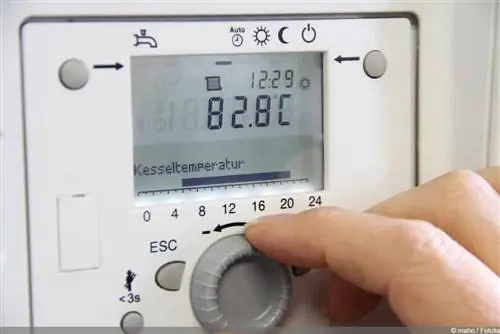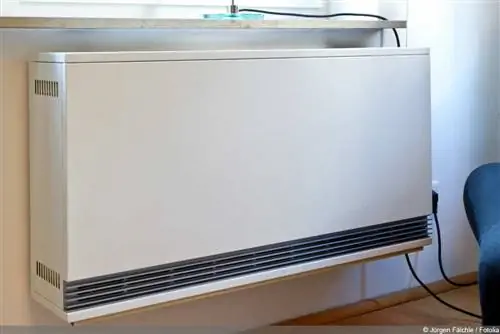- Author admin caroline@plants-knowledge.com.
- Public 2023-12-17 03:39.
- Last modified 2025-01-24 12:45.
Clever is definitely different: night storage heaters are among the most expensive heaters ever. Since they are powered by electricity, which in Germany often still comes from coal-fired power plants, they are also harmful to the environment and, above all, the climate. So replacing and disposing of them makes sense. Depending on which new heating system you choose, the state also gives subsidies or very cheap loans.
Principle and problem
Electric current can be converted into heat relatively easily. Just think of an immersion heater or a kettle. Night storage heaters, which conquered German households especially in the 1970s, work in a very similar way. You use the cheap night-time electricity for this. Today, however, it is still significantly more expensive than oil or gas. Heating the apartment with a night storage heater costs significantly more. But it is also ecologically questionable - at least if the electricity does not come from your own photovoltaic system on the roof. The production of electricity by coal-fired power plants releases large amounts of carbon dioxide and particulate matter, which have a severe impact on people and the environment. Replacing such a heater makes sense in two respects.
No ban

Contrary to many statements to the contrary, the operation of night storage heaters will not be prohibited in the future. The federal government enshrined a gradual ban in law in 2009 with the Energy Saving Ordinance. This ban was lifted in 2013. The background to this was not least the so-called energy transition. Sustainably produced green electricity should definitely be able to be used for heating. There is therefore no obligation to replace night storage heaters. However, that doesn't change the fact that there are significantly more efficient and significantly more environmentally friendly heating systems.
Funding opportunities
Since night storage heaters are not banned and therefore do not necessarily have to be replaced, there are no targeted funding or subsidies from the state. But that doesn't mean that you will come away empty-handed if you replace your old night storage heater. Rather, it depends on what type of heater you replace it with. The state sometimes pays considerable subsidies for a new heating system. This usually takes the form of particularly cheap loans rather than direct grants. The contact persons for this are the following government institutions.
Credit Institution for Reconstruction (KfW)
A state-owned bank that grants loans on favorable terms for energy-efficient and environmentally friendly heating systems upon application. A direct repayment subsidy for the loan is also possible
Federal Office of Economics and Export Control (BAFA)
This specifically promotes the replacement of heating pumps and the hydraulic balancing of heating systems.
Regional offices and municipal utilities
That offer funding programs for heating renewal tailored to a specific region or city
Tip:
City administrations and district offices can provide specific information about whether and what funding opportunities are available in a particular region. They usually also help with the application.
Money from the state is only available if the new heating system is actually efficient and environmentally friendly. It also has to fit the building. Before submitting an application, an energy consultation must therefore take place to clarify which heating system is best for the respective building. Anyone who does not decide on the recommended option after the consultation will in most cases come away empty-handed.
Note:
Energy advice is funded by the state. The prerequisite for this is that the chosen energy consultant is qualified and also approved by the state.
Alternatives

There are now many efficient, environmentally friendly alternatives to a night storage heater. Which one you choose depends primarily on the structural conditions of the building and the location. Basically, the following heating systems come into question:
- Oil heating
- Gas heating
- Pellet heating
- Electric heating with photovoltaic system
- Geothermal heating
- Heat pump heating
No matter which option you choose, the conversion usually involves significant changes to the building structure. It is therefore advisable to always carry out such a measure in conjunction with other renovation work. This often saves money and a lot of hassle. One thing that could be considered here would be measures to insulate buildings or replace windows. These energy-saving renovations can then also be subsidized by the state.
Tip:
Renewing your heating system should always be seen in connection with an energy-related renovation. In a sense, both belong together and cannot be viewed separately.
Dispose of night storage heater
Not all, but very many, especially older night storage heaters contain substances that clearly belong in the hazardous waste category. These pollutants are:
- Asbestos as insulation material
- Chromate in the storage stones
- PCB in electrical components
Night storage heaters must therefore be disposed of separately from household or construction waste. Disassembly, removal and disposal are best carried out by certified specialist companies. Under no circumstances should you attempt to do the work yourself and simply dismantle or shred a night storage heater. The risk of pollutants or toxins being released is simply far too great. Proper disposal is required by law. There is usually no funding for this.






